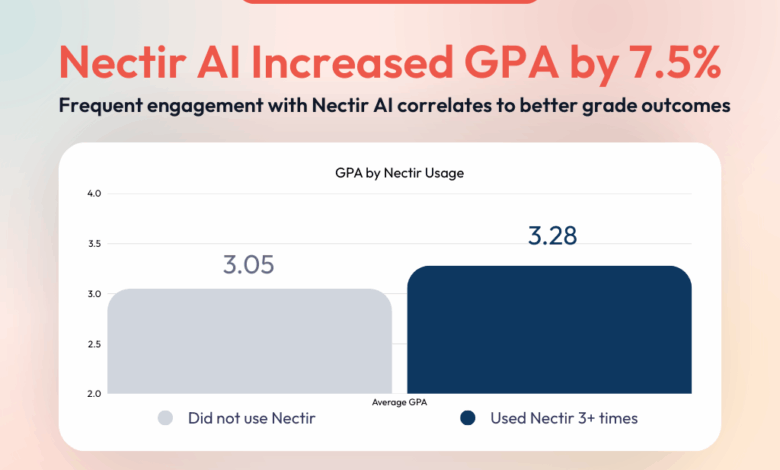
In the ongoing debate over AI’s role in the classroom, a new peer-reviewed study brings data to the table: AI course assistants, when implemented with guardrails, can significantly improve academic performance. A large-scale study conducted at Los Angeles Pacific University (LAPU) found that students using Nectir, a leading AI edtech platform, increased their GPAs by an average of 7.5%.
The study, published in Open Praxis, examined over 2,000 course enrollments across 99 classes, tracking nearly 1,900 students. LAPU is an entirely online and asynchronous university, primarily serving working adults and part-time students. These types of learners often face reduced access to real-time academic support which LAPU sought to solve by deploying Nectir’s AI-powered assistant, Spark, directly into its courses.
Unlike consumer-grade chatbots or general-purpose AI tools, Nectir was designed in collaboration with schools to function as a Socratic partner. The assistant guides students with tailored questions rather than simply providing answers. According to the study, students who interacted with Nectir at least three times were much more likely to see measurable GPA improvements. The research used four different statistical models to confirm the results, which held across age, gender, and ethnicity.
“Simply put, when students and faculty work hand-in-hand with AI, not as a shortcut, but as a partner, everyone wins,” said Nectir CEO and co-founder Kavitta Ghai. “We built Nectir to support deeper learning, not just faster answers. This research shows what’s possible when AI is implemented with intention and equity.”
The technology’s impact goes beyond just grades. Students used the assistant to brainstorm, validate understanding, and analyze concepts collaboratively. The tool is embedded directly within the university’s LMS, avoiding the need for external apps or logins, a key factor in making the technology accessible to all students, regardless of tech fluency.
Still, the research didn’t shy away from nuance. Not all students adopted the AI assistant, sometimes due to hesitation around new technology or access issues. That gap, the researchers noted, raises critical questions about the digital divide in higher education and the risks of inequity as AI adoption accelerates.
To that end, Nectir’s approach includes built-in safeguards around privacy, instructor-level customization, and strict adherence to education data compliance standards. Instructors retain control of how AI is used and are encouraged to guide its use toward critical thinking rather than task completion.
“Education technology has a responsibility to lower barriers, not raise them,” Ghai added. “The tools we build should support every learner, not just the most tech-savvy. Equity isn’t a feature. It’s a requirement.”
To learn more, visit https://www.nectir.io/.



